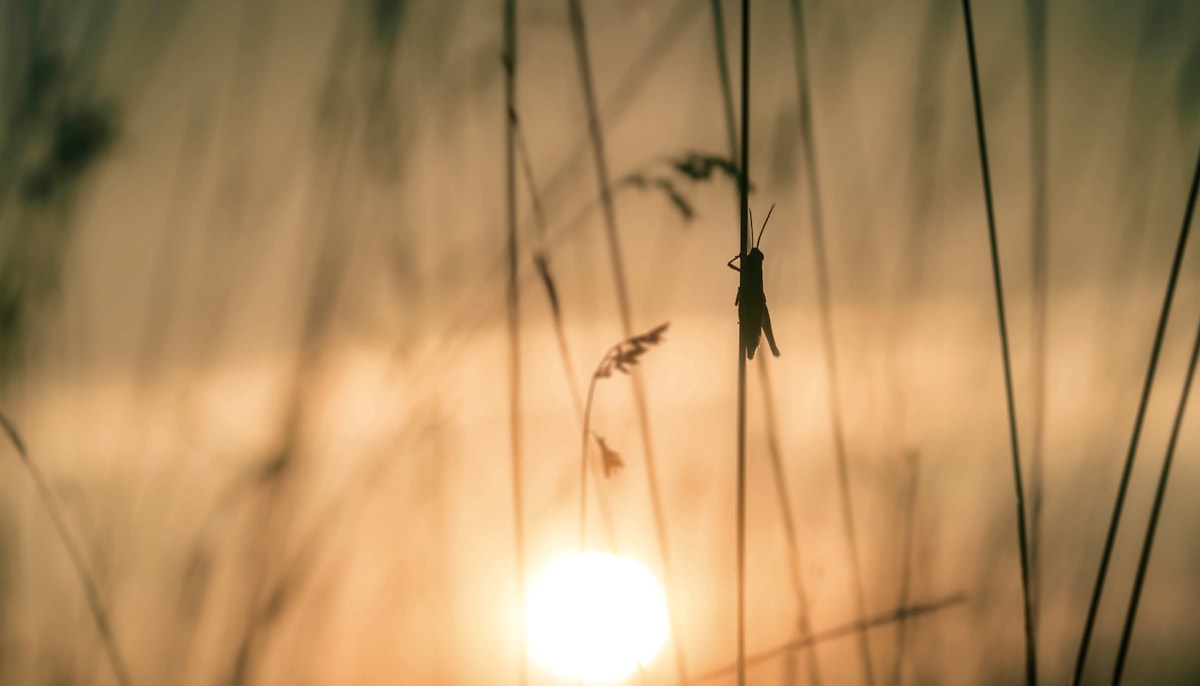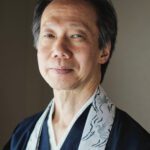I remember as a small child the experience of my first pet. Our family had traveled to Japan because my father’s study had taken us there. We rented an old, traditional wooden house in Tokyo where year round the wind whistled easily past windows and doors that never quite shut completely. I desperately wanted a pet dog, but my parents said that we would have to wait until we returned to the United States. One day, however, they said I could have another kind of pet. We went down to the local outdoor bazaar, and they bought a pet for me; it was a grasshopper in a small bamboo cage. It didn’t quite have the feel of the dog I had imagined.
When we got home, my parents showed me how to care for it by feeding it fruits and vegetables. It especially seemed to like cucumbers and watermelon; I was hooked. My mother was studying ikebana, the Japanese art of flower arrangement, and one day, we took the grasshopper out of its cage and put it on the flower blossom of one of her trial arrangements. The grasshopper took to eating the blossom, and it seemed so content that after awhile, when we left the house, we simply left the grasshopper munching on the flower. Thereafter, every time we went out, we left the grasshopper on the flower arrangement. Even though it could easily have escaped, it never even tried. When our little grasshopper died, I cried.
In the Shin Buddhist path, the emphasis is on the Buddha’s compassion for all sentient beings. As human beings, our ability to convey compassion to other people and creatures comes to us through the cosmic compassion of Amida Buddha. Yet, Amida Buddha is not viewed as being separate from us; rather, Amida Buddha, as boundless compassion, is our deepest, truest nature. For Shin Buddhists, nature and the universe are filled with boundless compassion.
Compassion means literally “to feel with.” Our family’s sense of feeling attuned to the life of the grasshopper came to us from the creature itself and from our own hearts, but more accurately from the deepest reality of oneness that we call Amida Buddha. However, in our foolish attachments, we tend to forget our true nature. For this reason, in Shin Buddhism we are called foolish beings filled with blind passions.
It may be beautiful to think of a small child feeling in tune with the rhythms of a grasshopper’s life. Yet, I did not have the same feeling when a mosquito bit me, or a dog barked at me. Thus, my own sense of compassion is limited, inconsistent. Nevertheless, the deep feeling of oneness, the reality of boundless compassion is always there, if only I would awaken to it. When I become impatient or irritated with someone or something, if I can be reminded that this is due to my own blind ego-attachment, then I may become gradually less impatient, more embracing. In this way, the ever-present compassion of life itself, of Amida Buddha, my own nature, breaks through my ego-self into the realization of boundless compassion.
Here in the Pacific Northwest, rain is plentiful. Thousands, millions, billions of raindrops fall from the sky every year. Just like snowflakes, however, no two raindrops are alike. Large or small, warmer or colder, liquid sunshine or refractions of a wintry gray, each takes a journey unique unto its own. Then, as they fall into the great Pacific Ocean, they all become as one, each giving itself to the Ocean of Compassion.
Each of us rises up with life, like water seeking to escape the salty seas of samsara, forgetting that liberation rests not in escape but in immersing ourselves in the very depths of suffering. Illuminated by the limitless warmth of the sun, we are reminded to return to our own true nature, in the ocean of samsara.
The clouds of ignorance release the sweet rain that descends, filling the ocean. The salty seas of samsara are transformed into the warm waters of boundless compassion. Each of us, these unique raindrops filled with blind passion, just as we are, enters and becomes the Ocean of Compassion. Rising and falling, rising and falling, we take this journey, over and over, forever and ever.
All beings are one with me, and I am led to become one with all beings. Illuminated, touched, embraced, and dissolved into the great Ocean of Compassion. I, this foolish being, entrust myself to Amida Buddha, my deepest, truest reality. Namu Amida Butsu.


